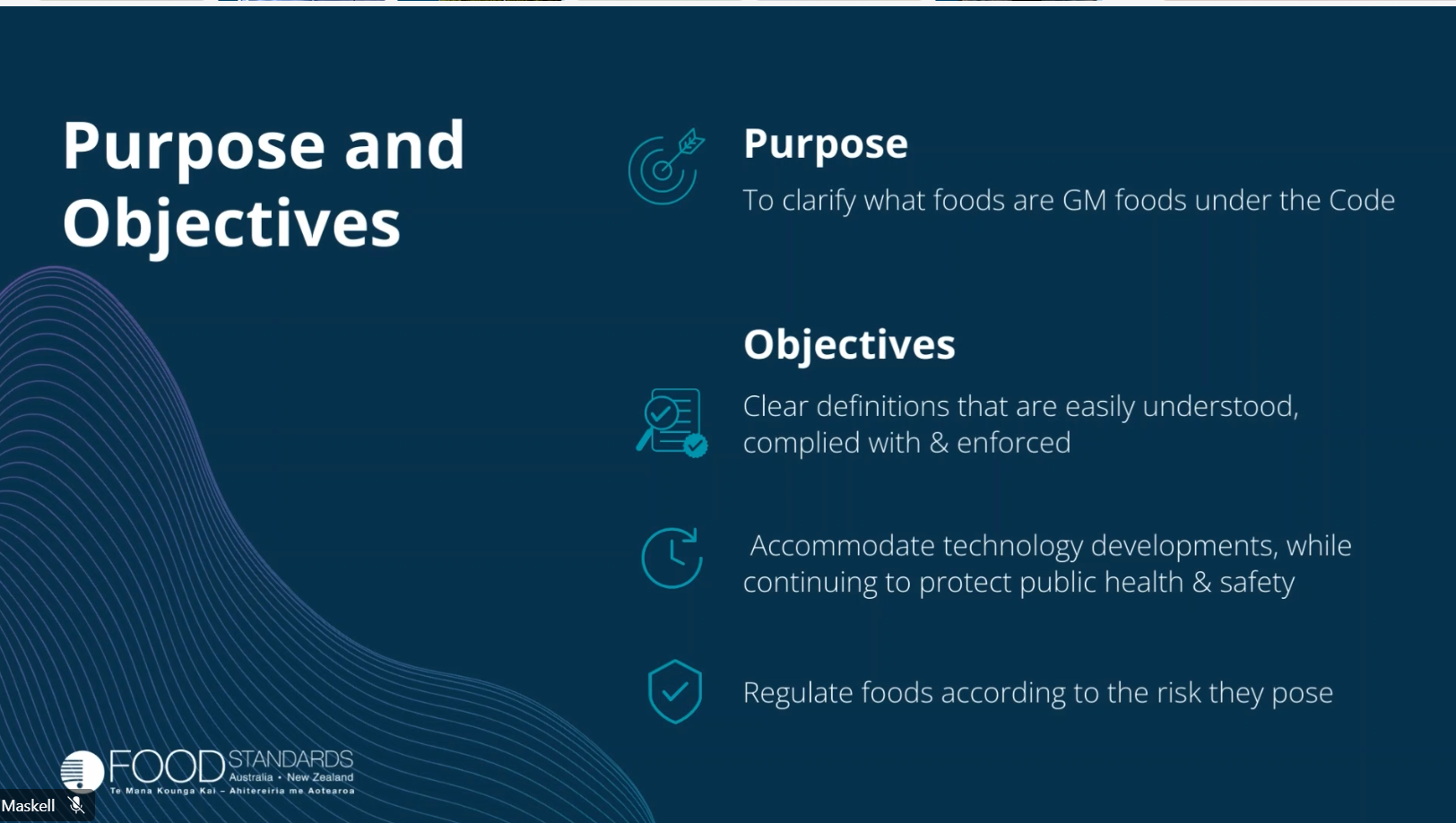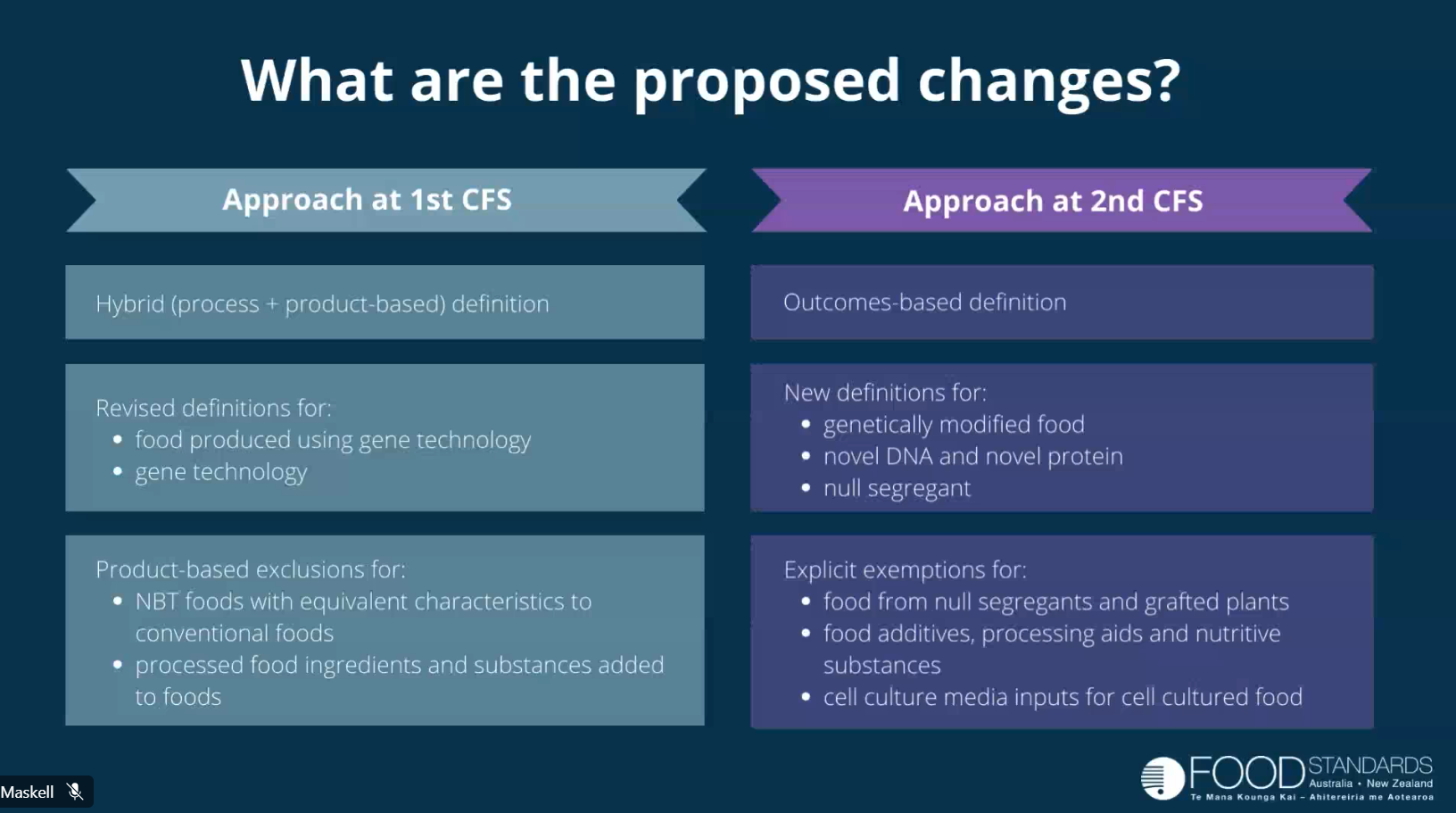Food Standards Australia New Zealand (FSANZ) is seeking feedback on Proposal P1055, which aims to redefine how genetically modified (GM) foods are classified. We urge the organic sector to unite in requesting an extension to the submission deadline and advocating for an open forum with civil society organisations and the broader community. This will allow for a transparent discussion of the full implications of the draft proposal, which has not been given adequate time for thorough public scrutiny.
We are concerned that FSANZ is not considering the broader implications that may undermine the due process required for such a significant regulatory change. You can make your own HERE (by 5pm September 10th, 2024)

P1055: The FSANZ Proposal
Proposal P1055 is FSANZ’s effort to update and clarify the definitions of GM foods within the Food Standards Code. FSANZ argues that the current definitions, which distinguish between “food produced using gene technology” and “gene technology,” are outdated and do not adequately cover the variety of modern techniques, including New Breeding Techniques (NBTs). To address this, FSANZ proposes a single, streamlined definition of “genetically modified food” and suggests exempting certain NBT foods and refined ingredients from pre-market assessment. The organic sector is concerned that exempting NBT foods could mean that some GMO foods would no longer need to be labelled. This could mislead consumers relying on clear labelling to make informed decisions about their eating choices.


What Are NBTs, and Why Do They Need to Be Labelled?
New Breeding Techniques (NBTs) are advanced genetic methods that alter the DNA of plants and animals. Although NBTs are sometimes marketed as different from traditional GMOs, they still involve genetic modification. The organic sector insists that food products produced using NBTs must be clearly labelled because they involve artificial genetic changes that consumers have the right to know about. Clear labelling ensures transparency and allows consumers to make informed choices aligned with their values, especially in maintaining the integrity of organic and natural food standards.
Why Is the Organic Sector Concerned About P1055?
The organic sector is deeply concerned about the rapid pace of the P1055 proposal and the potential consequences it poses for the organic sector in Australia and New Zealand. The proposal’s shift from a “process-based” to an “outcome-based” definition of GM foods that could lead to reduced transparency, making it harder for consumers to determine whether their food has been produced using gene technology. FSANZ’s decision to exclude NBT foods and refined ingredients from pre-market assessment, claiming they pose no greater risk than conventional foods, is particularly troubling. This approach risks undermining consumer trust and the integrity of organic labelling, which depends on full traceability and clear labelling of all GM ingredients. Despite public demand for labelling GM and gene-edited foods, FSANZ has stated that GM labelling is “out of scope” for this proposal, though some changes to labelling provisions are proposed.

Take Immediate Action: FSANZ P1055 Deadline of September 10th (no extensions)
The FSANZ Proposal P1055 poses a significant threat to the transparency and integrity of our organic standards. To ensure thorough public consultation, we must act now. We urgently need you to complete this survey and/or register a submission with FSANZ before September 10th.
Here’s How You Can Help:
- Register your own submission directly with FSANZ (prior to Sept 10th) – HERE
- Complete this Survey below – Share widely with your networks and friends
- Review the webinar hosted by FSANZ: This session provided an overview of the proposal to attendees.
- Join Organic Industries Australia – to advocate on behalf of the organic industry.
- Listen to interview from NZ regarding the impact on organic industry
Your Voice Matters
The organic sector depends on strong, clear regulations to maintain the integrity of our products and the trust of our consumers. Your participation is crucial in ensuring that these standards are not compromised.
Excellent resources are HERE (thanks to OANZ) for those that are seeking more information.
Thank you for your continued support and commitment to protecting our organic community.
If you are interested in supporting or helping with this campaign – drop us an email hello@organicinvestmentcooperative.com.au
Consider joining ORICoop HERE. Or Organic Industries Australia HERE (our organic industry body)

Please share the Consumer Survey HERE with as many consumers, customers and concerned eaters that you know!
FSANZ Proposal P1055 – Definitions for gene technology and new breeding techniques
Second Call for Submissions: Close on 10 September 2024, closes 6pm AST, 8pm NZT
FSANZ is proposing to exempt certain foods made through gene technologies like gene editing food. These foods derived from New Breeding Techniques (NBTs) / gene edited, genetically engineered or vat fermented foods will escape regulation and labelling as they will be considered the same as conventional foods (novel). The exempted GE foods will be released into the food chain untested, unlabelled and potentially unhealthy for the dietary needs of consumers. This could damage health and lead to illnesses that are misdiagnosed due to the lack of oversight and diagnostic methods for Health Professionals.
Please look at suggestions in the template below and re-write your submission in your own words.
FSANZ has a Consultation Hub where you can directly submit your comments or email submissions@foodstandards.gov.au or postal address ,which can be found on their site.
Letter Template
Re: Second Call for submission: P1055 Definitions for gene technology and new breeding techniques Email to: submissions@foodstandards.gov.au I object to the FSANZ proposal P1055 to exempt gene edited and GM food processes and ingredients from notification, assessment, regulation, and labelling. I therefore strongly insist on –
|
Reference material regarding the risk to the organic sector of this decision
- https://ata.land/the-hidden-costs-of-ge-crops-and-gmos/
- https://www.spectator.com.au/2024/09/fsanzs-paradigm-shift-in-gene-edited-food-regulation/
- Interview from NZ regarding the impact on their NZ market – LISTEN HERE
- OANZ action proposal – https://www.oanz.org/new-blog/fsanz-p1055-proposal-explained-organic-sector-urgent-action-required
Other World References –
https://www.thelancet.com/journals/lanplh/article/PIIS2542-5196(23)00255-3/fulltext
https://www.ncbi.nlm.nih.gov/pmc/articles/PMC6672233/
https://www.bbc.com/news/science-environment-68215777

